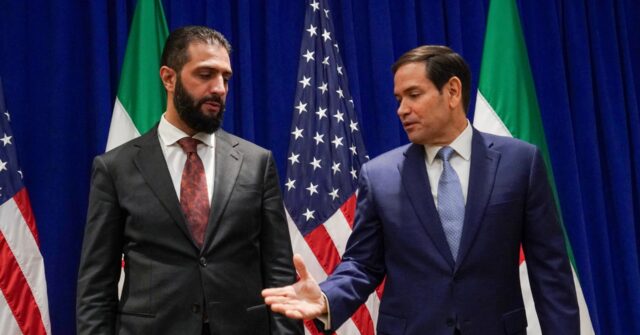Secretary of State Marco Rubio met with Syria’s interim President Ahmed al-Sharaa, the head of the jihadist organization Hayat Tahrir al-Sham (HTS), on the sidelines of the U.N. General Assembly (UNGA) in New York City on Monday.
The State Department said Rubio “underscored this opportunity for Syria to build a stable and sovereign nation following President Trump’s historic announcement earlier this year on sanctions relief for the Syrian people.”
According to the State Department’s brief summary of the meeting, Rubio and Sharaa “discussed ongoing counterterrorism efforts, efforts to locate missing Americans, and the importance of Israel-Syria relations in achieving greater regional security.”
Rubio and Sharaa did not offer any public comment about their meeting, although Rubio wrote a short post on social media platform X that largely repeated the State Department readout:
Syrian state media was likewise brisk in reporting the meeting, although it offered the additional detail that Sharaa wants the U.S. to repeal the Caesar Act.
The Caesar Syria Civilian Protect Act of 2019 placed a heavy round of sanctions against the Syrian government, which at the time was headed by dictator Bashar Assad. The Act directed the U.S. president to “impose sanctions on foreign persons that provide significant support, or engage in a significant transaction, with the Syrian government or those acting on behalf of Syria, Russia, or Iran.”
The Caesar Act also imposed “sanctions on those that knowingly provide various goods or services to Syria, such as aircraft for the military, technology for the government’s domestic petroleum production, items on the U.S. Munitions List, and items that the President believes are being used to commit human rights abuses against the Syrian people.”
The Caesar Act is named after a Syrian military defector who worked under the code name “Caesar.” He later revealed his true identity as Farid Nada al-Madhan, head of the judicial department for the Damascus military police. “Caesar” smuggled a massive trove of evidence to the world documenting the torture and murder of dissidents by the Assad regime.
Although President Donald Trump, who signed the Caesar Act into law during his first term, ordered the suspension of sanctions against Syria in July to assist Sharaa’s government with postwar rebuilding, a major dispute has arisen in Congress over whether to repeal the Act entirely.
The president can suspend sanctions for six months at a time on his authority and he has not yet indicated whether he wants Congress to remove the sanctions permanently or not. Some representatives believe Sharaa has not done enough to prove the Act should be repealed.
(L/R) US Secretary of State Marco Rubio shakes hands with Syrian President Ahmed al-Sharaa as US President Donald Trump delivers remarks to the United Nations General Assembly at the UN headquarters in New York City on September 23, 2025. (BRENDAN SMIALOWSKI/AFP via Getty)
These opponents of repealing the Act would like to see Sharaa’s government implement firm laws to protect religious minorities, to avoid a repeat of incidents like violent crackdown on Alawite Muslims in March, the bombing of a Damascus church in June, and the assault on the Druze by Bedouin Muslims – with help from Syrian government forces – in July.
The new Syrian government would like the sanctions permanently repeated to create more financial stability, which is much desired by international investors, while rolling six-month suspensions seem more appropriate to American lawmakers who worry about sectarian violence and government crackdown on minority groups.
“We have a big mission to build the economy. Syria has a diverse workforce. They love to work, it’s in its genes. So don’t be worried, just lift the sanctions and you will see the results,” Sharaa promised on Monday, telling U.S. lawmakers exactly what they want to hear.
Trump and Rubio would surely also like to see Sharaa do more to normalize relations with Israel, and permanent sanctions repeal would eliminate a good deal of U.S. leverage.
Sharaa said on Monday he hopes to resolve security disputes with Israel successfully, but he is a long way from joining the Abraham Accords, Trump’s grand initiative to build diplomatic relations between Israel and Arab states.
“Syria is different as those that are part of the Abraham Accords are not Israel’s neighbours. Syria has been subjected to more than a thousand Israeli raids, strikes and incursions from the Golan Heights into Syria,” he argued.
“There is also huge anger over what’s going on in Gaza, not only in Syria but in the entire world, and of course this impacts our position on Israel,” he added.
Read the full article here


